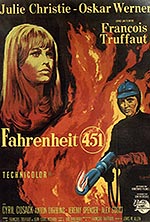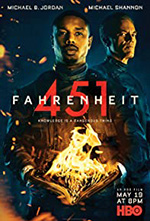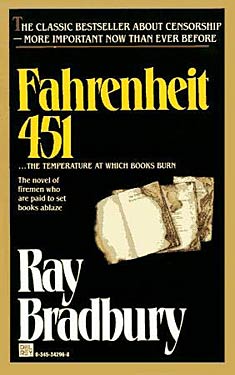
Added By: Administrator
Last Updated: valashain
Fahrenheit 451
| Author: | Ray Bradbury |
| Publisher: |
Ballantine Books, 1953 |
| Series: | |
|
This book does not appear to be part of a series. If this is incorrect, and you know the name of the series to which it belongs, please let us know. |
|
| Book Type: | Novel |
| Genre: | Science-Fiction |
| Sub-Genre Tags: | Dystopia Near-Future Human Development |
| Awards: | |
| Lists: |
|
| Links: | |
| Avg Member Rating: |
|
|
|
|
Film & Television Adaptations
Synopsis

"Ironically, Fahrenheit 451, an indictment of censorship, was itself censored by its publisher for thirteen years before Bradbury himself became aware of that. In 1967, Ballantine published an expurgated version of the novel to be used in high schools. Such words as 'hell,' 'damn' and 'abortion' were eliminated.
"In a novel of approximately one hundred and fifty pages, seventy-five passages were modified. Two episodes were actually changed. In one episode, a drunken man is changed to a sick man. In another, cleaning fluff out of a human naval becomes, in the expurgated version, cleaning ears.
"The expurgations went unnoticed because readers did not compare this version to the original. The copyright page did not indicate any edits. The expurgated version ran for ten printings. At the same time, the authentic 'adult' version was sold outside of high schools to the world at large. In 1973, after six years of publishing both editions, the publisher decided to publish only the censored work, so from 1973 to 1979 only that version was sold.
"In 1979, one of Bradbury’s friends showed him an expurgated copy. Bradbury demanded that Ballantine Books withdraw that version and replace it with the original, and in 1980 the original version once again became available. In this reinstated work, in the Author’s Afterword, Bradbury relates to the reader that it is not uncommon for a publisher to expurgate an author’s work, but he asserts that he himself will not tolerate the practice of manuscript 'mutilation.'" (Source: "The mutilation and rebirth of a classic: Fahrenheit 451," http://newsletter.library.villanova.edu/147)
Nowadays firemen start fires. Fireman Guy Montag loves to rush to a fire and watch books burn up. Then he met a seventeen-year old girl who told him of a past when people were not afraid, and a professor who told him of a future where people could think. And Guy Montag knew what he had to do....
Excerpt
It was a pleasure to burn.
It was a special pleasure to see things eaten, to see things blackened and changed. With the brass nozzle in his fists, with this great python spitting its venomous kerosene upon the world, the blood pounded in his head, and his hands were the hands of some amazing conductor playing all the symphonies of blazing and burning to bring down the tatters and charcoal ruins of history. With his symbolic helmet numbered 451 on his stolid head, and his eyes all orange flame with the thought of what came next, he flicked the igniter and the house jumped up in a gorging fire that burned the evening sky red and yellow and black. He strode in a swarm of fireflies. He wanted above all, like the old joke, to shove a marshmallow on a stick in the furnace, while the flapping pigeon-winged books died on the porch and lawn of the house. While the books went up in sparkling whirls and blew away on a wind turned dark with burning.
Montag grinned the fierce grin of all men singed and driven back by flame.
He knew that when he returned to the firehouse, he might wink at himself, a minstrel man, burnt-corked, in the mirror. Later, going to sleep, he would feel the fiery smile still gripped by his face muscles, in the dark. It never went away, that smile, it never ever went away, as long as he remembered.
He hung up his black beetle-colored helmet and shined it; he hung his flameproof jacket neatly; he showered luxuriously, and then, whistling, hands in pockets, walked across the upper floor of the fire station and fell down the hole. At the last moment, when disaster seemed positive, he pulled his hands from his pockets and broke his fall by grasping the golden pole. He slid to a squeaking halt, the heels one inch from the concrete floor downstairs.
He walked out of the fire station and along the midnight street toward the subway where the silent air-propelled train slid soundlessly down its lubricated flue in the earth and let him out with a great puff of warm air onto the cream-tiled escalator rising to the suburb.
Whistling, he let the escalator waft him into the still night air. He walked toward the corner, thinking little at all about nothing in particular. Before he reached the corner, however, he slowed as if a wind had sprung up from nowhere, as if someone had called his name.
The last few nights he had had the most uncertain feelings about the sidewalk just around the corner here, moving in the starlight toward his house. He had felt that a moment prior to his making the turn, someone had been there. The air seemed charged with a special calm as if someone had waited there, quietly, and only a moment before he came, simply turned to a shadow and let him through. Perhaps his nose detected a faint perfume, perhaps the skin on the backs of his hands, on his face, felt the temperature rise at this one spot where a person's standing might raise the immediate atmosphere ten degrees for an instant. There was no understanding it. Each time he made the turn, he saw only the white, unused, buckling sidewalk, with perhaps, on one night, something vanishing swiftly across a lawn before he could focus his eyes or speak.
But now tonight, he slowed almost to a stop. His inner mind, reaching out to turn the corner for him, had heard the faintest whisper. Breathing? Or was the atmosphere compressed merely by someone standing very quietly there, waiting?
He turned the corner.
The autumn leaves blew over the moonlit pavement in such a way as to make the girl who was moving there seem fixed to a sliding walk, letting the motion of the wind and the leaves carry her forward. Her head was half bent to watch her shoes stir the circling leaves. Her face was slender and milk-white, and in it was a kind of gentle hunger that touched over everything with tireless curiosity. It was a look, almost, of pale surprise; the dark eyes were so fixed to the world that no move escaped them. Her dress was white and it whispered. He almost thought he heard the motion of her hands as she walked, and the infinitely small sound now, the white stir of her face turning when she discovered she was a moment away from a man who stood in the middle of the pavement waiting.
The trees overhead made a great sound of letting down their dry rain. The girl stopped and looked as if she might pull back in surprise, but instead stood regarding Montag with eyes so dark and shining and alive that he felt he had said something quite wonderful. But he knew his mouth had only moved to say hello, and then when she seemed hypnotized by the salamander on his arm and the phoenix disc on his chest, he spoke again.
"Of course," he said, "you're our new neighbor, aren't you?"
"And you must be"—she raised her eyes from his professional symbols "—the fireman." Her voice trailed off.
"How oddly you say that."
"I'd—I'd have known it with my eyes shut," she said, slowly.
"What—the smell of kerosene? My wife always complains," he laughed. "You never wash it off completely."
"No, you don't," she said, in awe.
He felt she was walking in a circle about him, turning him end for end, shaking him quietly, and emptying his pockets, without once moving herself.
"Kerosene," he said, because the silence had lengthened, "is nothing but perfume to me."
"Does it seem like that, really?"
"Of course. Why not?"
She gave herself time to think of it. "I don't know." She turned to face the sidewalk going toward their homes. "Do you mind if I walk back with you? I'm Clarisse McClellan."
"Clarisse. Guy Montag. Come along. What are you doing out so late wandering around? How old are you?"
They walked in the warm-cool blowing night on the silvered pavement and there was the faintest breath of fresh apricots and strawberries in the air, and he looked around and realized this was quite impossible, so late in the year.
There was only the girl walking with him now, her face bright as snow in the moonlight, and he knew she was working his questions around, seeking the best answers she could possibly give.
"Well," she said, "I'm seventeen and I'm crazy. My uncle says the two always go together. When people ask your age, he said, always say seventeen and insane. Isn't this a nice time of night to walk? I like to smell things and look at things, and sometimes stay up all night, walking, and watch the sun rise."
They walked on again in silence and finally she said, thoughtfully, "You know, I'm not afraid of you at all."
He was surprised. "Why should you be?"
"So many people are. Afraid of firemen, I mean. But you're just a man, after all . . ."
He saw himself in her eyes, suspended in two shining drops of bright water, himself dark and tiny, in fine detail, the lines about his mouth, everything there, as if her eyes were two miraculous bits of violet amber that might capture and hold him intact. Her face, turned to him now, was fragile milk crystal with a soft and constant light in it. It was not the hysterical light of electricity but—what? But the strangely comfortable and rare and gently flattering light of the candle. One time, as a child, in a power failure, his mother had found and lit a last candle and there had been a brief hour of rediscovery, of such illumination that space lost its vast dimensions and grew comfortably around them, and they, mother and son, alone, transformed, hoping that the power might not come on again too soon . . .
And then Clarisse McClellan said:
"Do you mind if I ask? How long've you worked at being a fireman?"
"Since I was twenty, ten years ago."
"Do you ever read any of the books you burn?"
He laughed. "That's against the law!"
"Oh. Of course."
"It's fine work. Monday burn Millay, Wednesday Whitman, Friday Faulkner, burn 'em to ashes, then burn the ashes. That's our official slogan."
They walked still farther and the girl said, "Is it true that long ago firemen put fires out instead of going to start them?"
"No. Houses have always been fireproof, take my word for it."
"Strange. I heard once that a long time ago houses used to burn by accident and they needed firemen to stop the flames."
He laughed.
She glanced quickly over. "Why are you laughing?"
"I don't know." He started to laugh again and stopped. "Why?"
"You laugh when I haven't been funny and you answer right off. You never stop to think what I've asked you."
He stopped walking. "You are an odd one," he said, looking at her. "Haven't you any respect?"
"I don't mean to be insulting. It's just I love to watch people too much, I guess."
"Well, doesn't this mean anything to you?" He tapped the numerals 451 stitched on his char-colored sleeve.
"Yes," she whispered. She increased her pace. "Have you ever watched the jet cars racing on the boulevards down that way?"
"You're changing the subject!"
"I sometimes think drivers don't know what grass is, or flowers, because they never see them slowly," she said. "If you showed a driver a green blur, Oh yes! he'd say, that's grass! A pink blur! That's a rose garden! White blurs are houses. Brown blurs are cows. My uncle drove slowly on a highway once. He drove forty miles an hour and they jailed him for two days. Isn't that funny, and sad, too?"
"You think too many things," said Montag, uneasily.
"I rarely watch the ‘parlor walls' or go to races or Fun Parks. So I've lots of time for crazy thoughts, I guess. Have you seen the two hundred-foot-long billboards in the country beyond town? Did you know that once billboards were only twenty feet long? But cars started rushing by so quickly they had to stretch the advertising out so it would last."
"I didn't know that!" Montag laughed abruptly.
"Bet I know something else you don't. There's dew on the grass in the morning."
He suddenly couldn't remember if he had known this or not, and it made him quite irritable.
"And if you look"—she nodded at the sky—"there's a man in the moon."
He hadn't looked for a long time.
They walked the rest of the way in silence, hers thoughtful, his a kind of clenching and uncomfortable silence in which he shot her accusing glances. When they reached her house all its lights were blazing.
"What's going on?" Montag had rarely seen that many house lights.
"Oh, just my mother and father and uncle sitting around, talking. It's like being a pedestrian, only rarer. My uncle was arrested another time—did I tell you?—for being a pedestrian. Oh, we're most peculiar."
"But what do you talk about?"
She laughed at this. "Good night!" She started up her walk. Then she seemed to remember something and came back to look at him with wonder and curiosity. "Are you happy?" she said.
"Am I what?" he cried.
But she was gone—running in the moonlight. Her front door shut gently.
"Happy! Of all the nonsense."
He stopped laughing.
He put his hand into the glove hole of his front door and let it know his touch. The front door slid open.
Of course I'm happy. What does she think? I'm not? he asked the quiet rooms. He stood looking up at the ventilator grille in the hall and suddenly remembered that something lay hidden behind the grille, something that seemed to peer down at him now. He moved his eyes quickly away.
What a strange meeting on a strange night. He remembered nothing like it save one afternoon a year ago when he had met an old man in the park and they had talked . . .
Montag shook his head. He looked at a blank wall. The girl's face was there, really quite beautiful in memory: astonishing, in fact. She had a very thin face like the dial of a small clock seen faintly in a dark room in the middle of a night when you waken to see the time and see the clock telling you the hour and the minute and the second, with a white silence and a glowing, all certainty and knowing what it had to tell of the night passing swiftly on toward further darknesses, but moving also toward a new sun.
"What?" asked Montag of the other self, the subconscious idiot that ran babbling at times, quite independent of will, habit, and conscience.
He glanced back at the wall. How like a mirror, too, her face. Impossible; for how many people did you know who refracted your own light to you? People were more often—he searched for a simile, found one in his work—torches, blazing away until they whiffed out. How rarely did other people's faces take of you and throw back to you your own expression, your own innermost trembling thought?
What incredible power of identification the girl had; she was like the eager watcher of a marionette show, anticipating each flicker of an eyelid, each gesture of his hand, each flick of a finger, the moment before it began. How long had they walked together? Three minutes? Five? Yet how large that time seemed now. How immense a figure she was on the stage before him; what a shadow she threw on the wall with her slender body! He felt that if his eye itched, she might blink. And if the muscles of his jaws stretched imperceptibly, she would yawn long before he would.
Why, he thought, now that I think of it, she almost seemed to be waiting for me there, in the street, so damned late at night . . .
He opened the bedroom door.
It was like coming into the cold marbled room of a mausoleum after the moon has set. Complete darkness, not a hint of the silver world outside, the windows tightly shut, the chamber a tomb world where no sound from the great city could penetrate. The room was not empty.
He listened.
Copyright © 1953 by Ray Bradbury
Reviews
Images

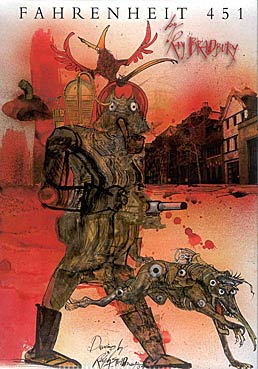



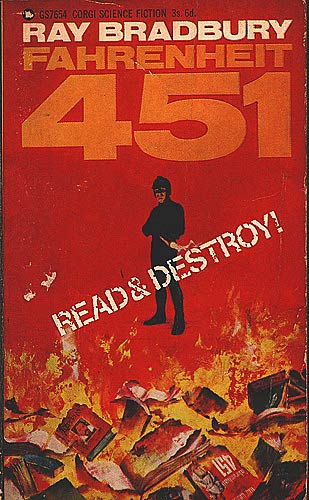

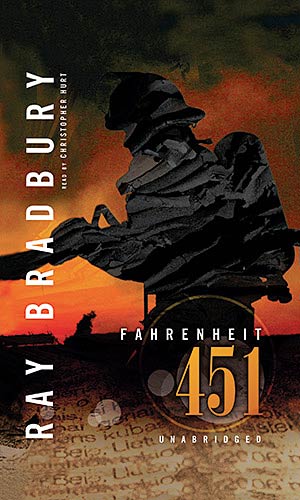
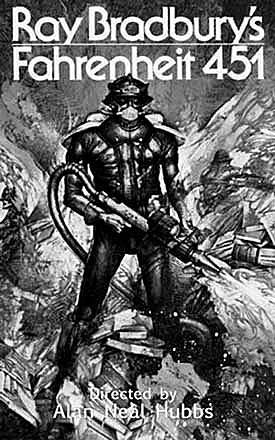
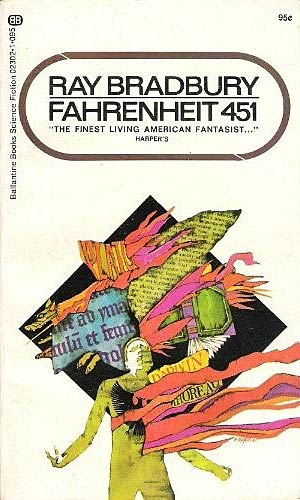

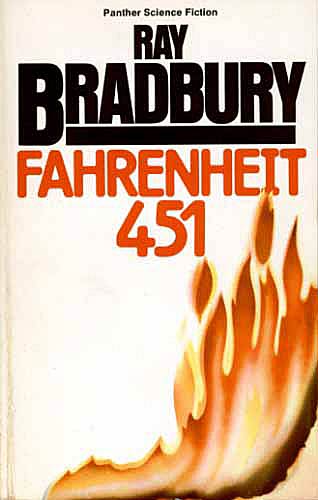



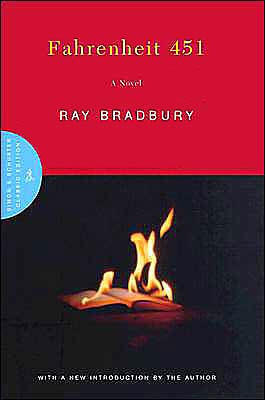



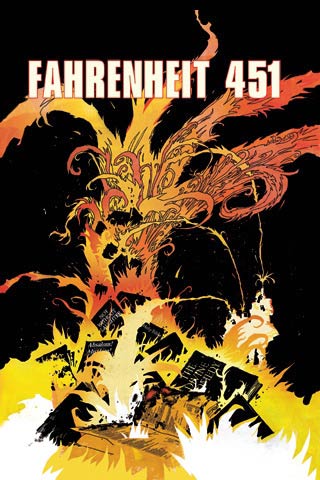




















 Full Details
Full Details





